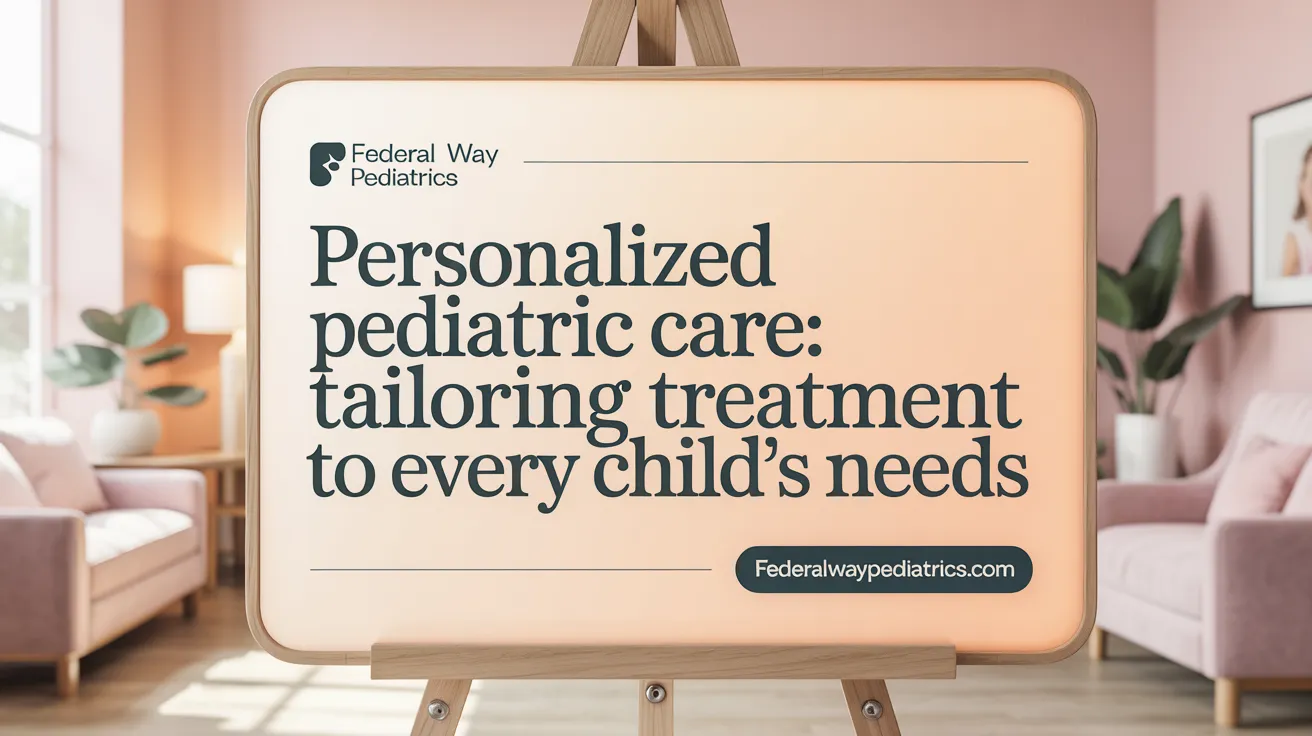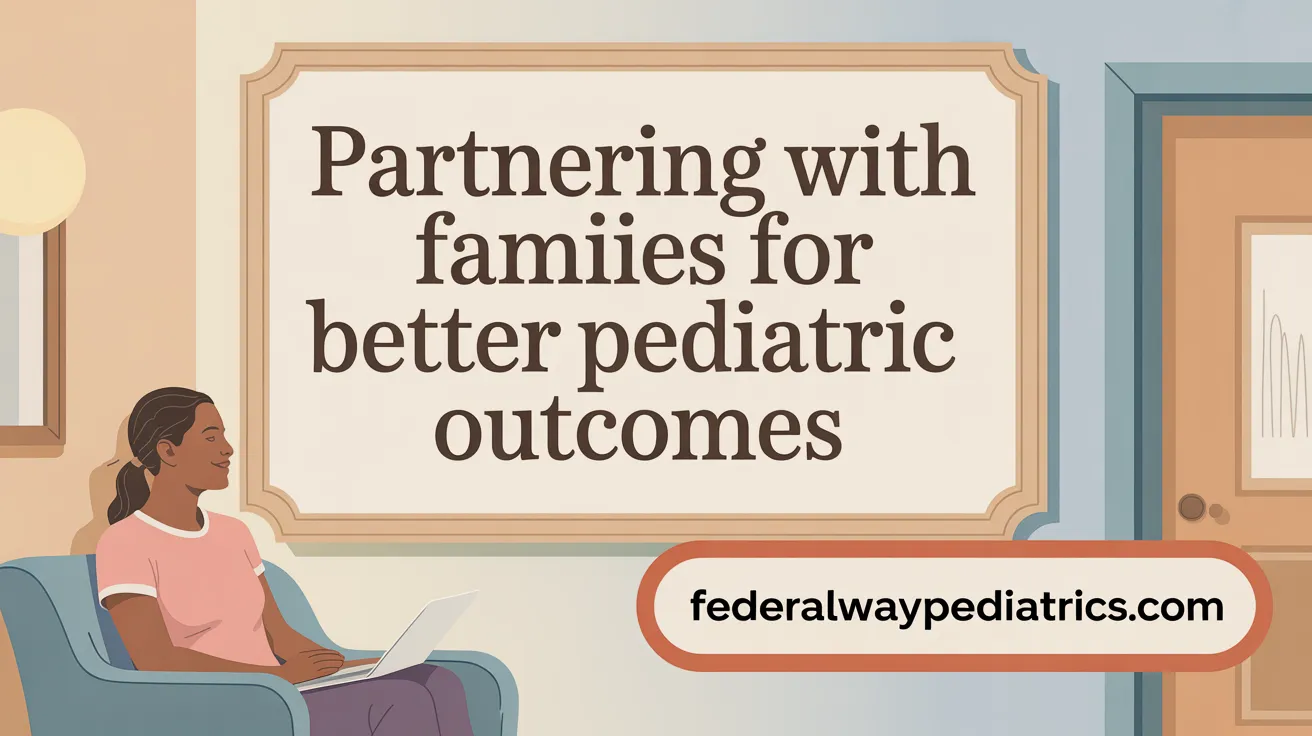Introducing Personalized and Compassionate Pediatric Care
What Is Personalized Pediatric Care?
Personalized pediatric care means offering healthcare tailored uniquely to each child's health history, developmental needs, and family context. It involves establishing strong, trusting relationships between pediatricians, children, and their families, fostering open communication. This approach enables early detection of health issues by closely monitoring growth patterns and behavioral progress, ensuring that interventions are timely and appropriate.
The Importance of Compassionate Care
Compassion in pediatric medicine goes beyond clinical treatment—it includes active listening, empathy, and thoughtful communication suited to a child's age. Compassion creates a nurturing environment where children feel secure and supported, reducing their anxiety during healthcare visits. It also addresses emotional and mental health needs, vital for holistic well-being and resilience in children with chronic conditions or emotional challenges.
Comprehensive Pediatric Services Offered
Effective personalized care encompasses a range of services—from routine wellness checkups and vaccinations to specialized care for chronic conditions like asthma and diabetes. Services may be delivered through various convenient methods including in-office visits, home care, and telehealth options ensuring accessibility and continuous support. Pediatric care also involves multidisciplinary coordination, developmental monitoring, mental health support, and family education to empower parents in their roles.
This integrated, compassionate approach aims to support every child's overall health and development in a way that respects their individuality and promotes lasting well-being.
Building Trust and Continuity in Pediatric Relationships

What is the importance of continuity of care in pediatrics?
Continuity of care means that a child sees the same healthcare provider regularly throughout their childhood. This consistent relationship fosters familiarity, making children more comfortable and providers better able to monitor growth, development, and health trends over time. It supports early detection of subtle health changes and facilitates personalized healthcare tailored to each child’s unique needs. For more details, see Continuity of care in pediatrics and Continuity of care for children.
How do ongoing provider relationships benefit child development?
Long-term pediatric care allows providers to understand individual developmental milestones and behavioral changes. This continuity supports timely intervention for issues such as motor delays, speech problems, and mental health concerns. Pediatricians can track progress reliably and adjust treatment plans as children grow, promoting optimal physical and emotional development. Read more about Tracking developmental milestones and Compassionate care for children with special needs.
What role does trust play in pediatric care, especially with emotional or sensitive topics?
Trust built through continuous care encourages children and adolescents to feel safe discussing sensitive topics, including bullying, mental health, and identity issues. This openness helps pediatricians provide comprehensive care that addresses both physical and emotional health. Trust also reduces anxiety during visits, improving cooperation and health outcomes. For further insights, visit Compassionate care in pediatric medicine and Patient- and Family-Centered Care.
What are the benefits of consistent pediatric care for parents and children?
For parents, having a stable healthcare provider means receiving personalized guidance reflective of their child’s history, reducing the stress of repeatedly explaining health backgrounds. For children, it ensures comfort and security in their care environment. Consistency in care also streamlines communication and supports a partnership between families and pediatricians, enhancing decision-making and overall health management throughout childhood. Additional information can be found at Personalized pediatric care and Patient and Family-Centered Medical Home.
The Impact of Compassionate Care on Pediatric Outcomes

What is Compassionate Pediatric Care?
Compassionate pediatric care goes beyond gentle treatment; it involves active listening in child healthcare, empathy, and clear communication tailored to the developmental stage of each child and their family. It creates a nurturing environment for children where children feel safe, valued, and understood, aligning with the principles of the Pediatric Compassion Model.
Emotional and Clinical Benefits for Children and Families
Research shows that compassionate care reduces fear and anxiety in young patients, leading to better cooperation during medical procedures. This approach improves clinical outcomes like faster recovery and fewer complications. It also supports families by addressing their concerns, reducing stress, and building trust with healthcare providers. Learn more about the benefits of empathy in pediatric care and the importance of compassionate care in pediatrics.
How Are Child-Friendly Environments Created?
Creating a welcoming and comforting healthcare setting is essential. Pediatric clinics use colorful decor, toys, and comfort items to make visits less intimidating for children. Such environments help reduce apprehension and foster a sense of security, promoting child-friendly healthcare environments, which encourage positive healthcare experiences.
Why Involving Children in Care Decisions Matters
Engaging children in their care processes empowers them and decreases feelings of helplessness. Age-appropriate explanations and involving older children in decision-making encourage cooperation and improve health outcomes. Respecting a child’s voice fosters trust and motivates them to actively participate in their health journey. See more on supporting children's decision-making capacity and respecting minor patients' developing autonomy and the importance of compassionate and humane pediatric care.
Tailoring Healthcare: The Essentials of Personalized Pediatric Care

What is Individualized Treatment Planning in Pediatric Care?
Personalized pediatric care starts with creating treatment plans tailored to each child’s unique health profile. This includes considering the child’s medical history, family health patterns, genetic factors, and lifestyle. For example, at Siddiqui Pediatrics in Federal Way, Washington, pediatricians use this approach to tailor wellness plans and treatment strategies that meet individual needs beyond generalized protocols.
How Does Personalized Care Support Early Detection?
By building lasting relationships and closely monitoring each child’s growth and development, pediatricians can identify health or developmental concerns earlier than usual. Tracking milestones like motor skills and speech development individually allows providers to intervene promptly. This individualized attention is supported through regular health visits that adapt to each child’s evolving needs as described in Personalized pediatric care enhancing child's well-being.
How Are Chronic Conditions Managed with Personalized Approaches?
Chronic diseases such as asthma and diabetes benefit from personalized management plans. These plans consider medication sensitivities, dietary preferences, and lifestyle factors unique to the child, improving outcomes and adherence. At Coastal Pediatric Medical Group, for instance, evidence-based personalized strategies ensure children receive adjustments that fit their circumstances.
What Role Do Technology and Innovations Play?
Advancements like genetic testing, telemedicine, and AI are revolutionizing personalized pediatric care. These tools enable detailed health insights and improve accessibility to tailored services. Clinics like Omega Pediatrics utilize telehealth and remote monitoring to reach underserved populations and customize care effectively. Additionally, integration of fetal echocardiograms and other diagnostics in clinics such as Dr. Nauman Ahmad’s practice help deliver precise care closely linked to genetic and prenatal factors.
Personalized pediatric care, therefore, blends comprehensive health knowledge with innovative technology to deliver individualized, proactive, and effective health management tailored to every child’s needs.
Family-Centered and Accessible Care: Partnering for Child Health

What is Patient- and Family-Centered Care and What Are Its Benefits?
Patient- and family-centered care is a collaborative approach that builds a partnership among the child, family, and healthcare providers. It respects the family's culture, values, and strengths while actively involving them in clinical decision-making. Key principles include listening and respecting families, sharing honest information, and empowering families to participate meaningfully in their child's healthcare. Learn more about the Patient- and Family-Centered Care and Its Benefits.
Research has shown this approach improves health outcomes, reduces nonurgent emergency visits, and decreases anxiety during medical procedures. It also enhances family satisfaction and fosters stronger, trusting relationships between families and pediatricians. Hospitals practicing this model report fewer medical errors and shorter hospital stays.
What Accessibility Challenges Exist in Pediatric Care and How Are They Addressed?
Accessibility in pediatric care involves overcoming barriers such as transportation difficulties, financial hardship, scheduling conflicts, and language differences. Telemedicine has become a crucial tool, offering convenient healthcare access, especially for families in rural areas or those facing transportation challenges. Explore more about Personalized and Accessible Pediatric Care and Advances in Telemedicine and Pediatric Healthcare Accessibility.
Community initiatives, such as mobile clinics, school partnerships, and multilingual interpreter services, also help improve care reach. These efforts, combined with technology like electronic health records and remote patient monitoring, promote equitable care for all children. Legislative support for telehealth reimbursement and insurance coverage further advances accessibility.
How Can Families and Caregivers Be Supported Through Education and Resources?
Supporting families and caregivers is vital in pediatric care. Providing clear, culturally sensitive education empowers parents in making informed medical decisions. Resources such as care coordination programs, peer support groups, and counseling contribute to caregiver well-being and resilience. See more on Supporting Families and Caregivers in Pediatric Care.
Healthcare providers play a key role by establishing open communication channels and offering guidance tailored to each family's situation. This family-centered support helps reduce stress and enhances the overall health experience for children.
How Does Equity and Inclusivity Feature in Pediatric Healthcare?
Equity and inclusivity in pediatric care ensure that every child receives personalized attention irrespective of their background or challenges. Practices that emphasize cultural competence and address social determinants of health foster an inclusive environment. Check out Equity and Personalized Pediatric Care.
Family-centered medical homes prioritize continuous, comprehensive care that accommodates diverse needs, including support for children with special healthcare requirements. By promoting inclusive policies and community outreach, pediatric providers contribute to healthier, well-supported children and families across all populations. For additional insights, see the Patient and Family-Centered Medical Home.
Specialized Pediatric Care and Compassion for Complex Needs
How Are Children with Chronic Illnesses and Special Needs Supported in Pediatric Care?
Children with chronic illnesses and special needs receive specialized, personalized pediatric care that addresses their unique medical and developmental challenges. This includes management plans tailored to their medication sensitivities, lifestyle, and emotional well-being. Early interventions such as physical, speech, and occupational therapies are customized through Individualized Education Plans (IEPs) to promote optimal developmental progress. Pediatric providers also foster inclusive and engaging environments, supportive of social interaction and confidence building.
In What Ways Are Compassionate Care Approaches Integrated into Pediatric Critical and Oncology Care?
Compassionate care in pediatric critical and oncology settings goes beyond medical treatment to emphasize empathy, active listening, and trust-building. It focuses on creating nurturing environments that reduce fear and anxiety for children and families. Compassion involves attending to both physical symptoms and emotional needs, enhancing quality of life and clinical outcomes. The Pediatric Compassion Model highlights beneficence, human connection, and responsive acts as core to delivering compassionate healthcare.
What Ethical Considerations Exist in Pediatric Decision-Making and Consent?
Ethical pediatric care balances parental responsibility with supporting the child's developing autonomy. Physicians advocate for shared decision-making by involving children in their care according to their capacity and providing parents with compassionate education and guidance. In critical situations, swift interventions may be necessary, but generally, respect for assent and best-interest standards is prioritized. Multidisciplinary ethics consultations can assist in resolving conflicts about treatment decisions. For more on this, see AMA guidance on pediatric decision-making and ethical decision making in pediatric medicine.
Why Is Individualized Education and Therapy Planning Essential for Children with Special Needs?
Each child's unique strengths and challenges guide the development of tailored education and therapy plans. These plans incorporate evidence-based therapies such as sensory integration, speech-language therapy, and occupational and physical therapies adapted to the child's pace and preferences. Ongoing adjustments ensure continuous support for developmental milestones and social inclusion, ultimately fostering greater independence and self-confidence. Learn more about this compassionate approach to caring for children with special needs and the role of Individualized Education Plans (IEPs).
Embracing Personalized and Compassionate Practices for Lifelong Child Health
Benefits of Integrated Personalized and Compassionate Pediatric Care
Personalized care enhances early detection, chronic condition management, and emotional support tailored to each child's unique needs. Compassionate care builds trusting relationships, reduces anxiety, and fosters cooperation, improving both clinical and psychosocial outcomes. Together, they promote comprehensive, continuous, and family-centered healthcare that supports optimal growth and development.
Call to Action for Parents and Providers
Parents should seek pediatric providers who prioritize individualized, empathetic approaches and maintain ongoing partnerships. Providers are encouraged to integrate personalized strategies with compassionate communication to empower families and children, ensuring accessible and equitable care.
Vision for the Future
The future of pediatric healthcare envisions expanded use of technology like telemedicine and genetic testing combined with a steadfast commitment to compassion and personalization. This combined approach aims to improve health equity, enhance preventive care, and create nurturing environments where all children can thrive throughout their lives.
